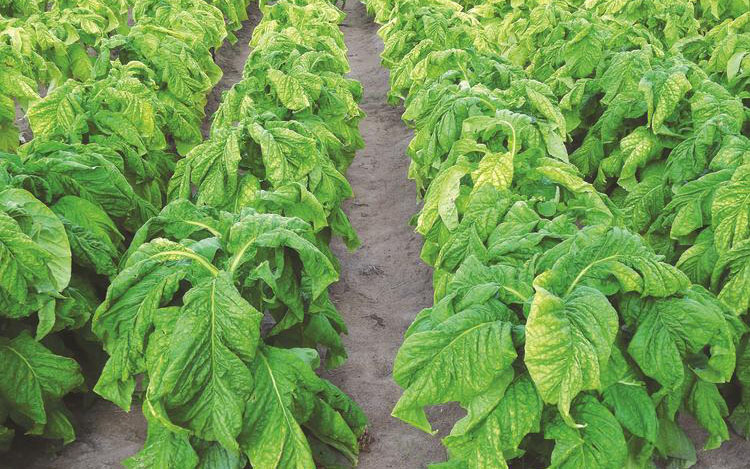Sporadic incidences of white mould on KRK66: Current, future solutions

In the 2015 /16 season growers reported incidences of white mould (Erysiphe cichoracearum) on the variety KRK66. This was most unexpected as, with the exception of K30R, KRK29 and K RK61, all Kutsaga varieties were bred for white mould resistance and no incidences of the disease had been reported since the introduction of KE1 in 1968. However, KRK29, a variety grown by a sizeable number of growers seems not to have succumbed to white mould.
To appreciate the nature and extent of the problem, the Plant Breeding team based at Kutsaga visited every farm that reported white mould problems and collected samples of the pathogen for further tests.
Our findings
Molecular analysis performed on the white mould samples collected from affected farms showed that the white mould samples were genetically different from each other.
Additionally, they were all different from the white mould isolate used to generate the original resistance. This isolate was genetically distinct from all other samples. Other white mould samples had only 40-50 percent genetic similarities to each other. These results suggest that there are new strains or variants of the white mould that have emerged.
Laboratory, greenhouse and field tests revealed that only KRK66 was succumbing to white mould. However, the tests also showed that a sister line to one of the KRK66 parentals remained white mould resistant. This sister line incorporates a different source of white mould resistance.
It is important to note that not all TRB varieties incorporate the same source of white mould resistance in their genetic make-up. Re-constitution of KRK66 with the sister line resulted in progeny exhibiting complete resistance to white mould in greenhouse tests.
Further tests were the conducted to confirm the pathogen species identity, and it emerged that in addition to the Erysiphe cichoracearum previously reported as the sole species causing powdery mildew on tobacco, two additional species namely Erysiphe Erysphe orontii and Epicoccum sorghinum were isolated from infected tobacco.
Possible triggers
White mould management in tobacco has been predominantly based on variety resistance and disease escape brought about by the absence of conducive weather conditions.
The fact that climate change is causing the emergence of new disease strains/variants is well documented. This hypothesis is being explored for this current white mould puzzle.
However, work to re-constitute KRK66 with the sister line has been initiated. We are also looking at double recessive, co-dominant and dominant genes in white mould resistance management. It is hoped that this work will resolve this problem.
Chemical control options
In the mean time, growers with white mould problems can apply foliar sprays of the fungicide tebuconazole, available on the market as Folicur® or Tebuconazole® to control the disease. Strobylurin fungicides such as Azoxystrobin® and Trifloxystrobin® that are registered for the management of Alternaria and frogeye are also reported elsewhere as effective against this disease.
Treatment should start at the first sign of infection or 6-8 weeks after planting when most of the buds are just clear of the heart leaves.
Way forward
The Tobacco Research Board will continue to engage affected growers and provide them with white mould management information.
We will also provide growers with white mould alerts (based on weather conditions), perform white mould scouting and surveillance in growing districts and train growers on effective spraying techniques.
KRK66 seed currently on the market may still produce susceptible plants if weather conditions are conducive.
We wish to reassure all growers that we take their concerns very seriously and we believe we have addressed the problem of white mould on KRK66 going forward.
- Should growers require more information, they can contact the Tobacco Research Board’s Plant Health Services or Plant Breeding Divisions on telephone 575289-94 or toll free 0 800 4511 and email: [email protected].








Comments